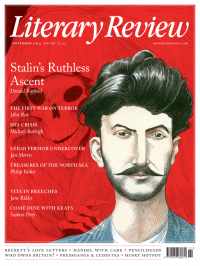Jonathan Barnes
Wheel of Fortune
Funny Girl
By Nick Hornby
Viking 342pp £18.99
Barbara Parker, the protagonist of Nick Hornby’s new novel, is, we are told, ‘pin-up sexy, all legs and bosoms and blonde hair’. She is also a talented and quick-witted actress who, escaping her hometown of Blackpool on the day when she wins the town’s beauty contest, comes to London in 1964 to seek her fortune. After a spell as a shop girl, a chance encounter with an agent results first in her changing her name to the supposedly more commercial ‘Sophie Straw’ and then in auditioning for a new television show. This she predictably aces. She quickly finds herself playing the lead in a sitcom – Barbara (and Jim) – which is adored by the nation (‘the most popular comedy series in Britain’) and praised by the critics (‘Miss Straw is the most extraordinarily gifted comic actress I have seen since the war’). Famous, feted and sleeping with her handsome co-star, decline of one sort or another cannot be too far away.
At its best, Funny Girl displays that warm, tolerant understanding of human nature that has characterised Hornby’s finest work. Sophie’s relationship with her family and her slow-burning romance with the sitcom’s director and producer, Dennis Maxwell-Bishop, are touchingly portrayed and the author is careful to accord each of his characters

Sign Up to our newsletter
Receive free articles, highlights from the archive, news, details of prizes, and much more.@Lit_Review
Follow Literary Review on Twitter
Twitter Feed
Under its longest-serving editor, Graydon Carter, Vanity Fair was that rare thing – a New York society magazine that published serious journalism.
@PeterPeteryork looks at what Carter got right.
Peter York - Deluxe Editions
Peter York: Deluxe Editions - When the Going Was Good: An Editor’s Adventures During the Last Golden Age of Magazines by Graydon Carter
literaryreview.co.uk
Henry James returned to America in 1904 with three objectives: to see his brother William, to deliver a series of lectures on Balzac, and to gather material for a pair of books about modern America.
Peter Rose follows James out west.
Peter Rose - The Restless Analyst
Peter Rose: The Restless Analyst - Henry James Comes Home: Rediscovering America in the Gilded Age by Peter Brooks...
literaryreview.co.uk
Vladimir Putin served his apprenticeship in the KGB toward the end of the Cold War, a period during which Western societies were infiltrated by so-called 'illegals'.
Piers Brendon examines how the culture of Soviet spycraft shaped his thinking.
Piers Brendon - Tinker, Tailor, Sleeper, Troll
Piers Brendon: Tinker, Tailor, Sleeper, Troll - The Illegals: Russia’s Most Audacious Spies and the Plot to Infiltrate the West by Shaun Walker
literaryreview.co.uk